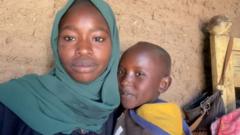Violeta Barrios de Chamorro, who made history as the first woman to lead a Central American nation following a destructive civil war, has died at the age of 95. Her legacy as a symbol of unity and resilience endures.
Violeta Barrios de Chamorro, Pioneering Central American Leader, Passes Away at 95

Violeta Barrios de Chamorro, Pioneering Central American Leader, Passes Away at 95
The former president of Nicaragua, who uniquely shaped the nation's history as its first female leader, succumbed to illness in Costa Rica.
In a significant loss to Nicaraguan history, Violeta Barrios de Chamorro passed away on Saturday morning in her San Jose, Costa Rica apartment, as confirmed by her son, Pedro Joaquín Chamorro. She led Nicaragua as its first female president from 1990, following a tumultuous era marked by civil conflict. Chamorro’s election served as a beacon of hope for many in a nation recovering from deep political fractures.
Born on October 18, 1929, in Rivas, Nicaragua, Chamorro emerged as a formidable political figure following the assassination of her husband, Pedro Joaquín Chamorro. Her otherwise privileged upbringing as part of a wealthy family allowed her to gain insight into the political challenges facing Nicaragua, as her husband fought fiercely against authoritarian regimes.
During her presidency in the 1990s, she championed the need for national reconciliation while delegating daily governance to family members. Her tenure was marked by mixed responses; despite criticism from various political factions, public sentiment later painted her as an emblem of unity and optimism.
Violeta’s legacy has grown over the years, establishing her as a revered figure with a profound connection to her Christian faith—a role model for many Nicaraguans striving for peace and stability in their country's future. Her achievements have inspired generations, illustrating the impactful role of women in leadership amidst adversity.
Born on October 18, 1929, in Rivas, Nicaragua, Chamorro emerged as a formidable political figure following the assassination of her husband, Pedro Joaquín Chamorro. Her otherwise privileged upbringing as part of a wealthy family allowed her to gain insight into the political challenges facing Nicaragua, as her husband fought fiercely against authoritarian regimes.
During her presidency in the 1990s, she championed the need for national reconciliation while delegating daily governance to family members. Her tenure was marked by mixed responses; despite criticism from various political factions, public sentiment later painted her as an emblem of unity and optimism.
Violeta’s legacy has grown over the years, establishing her as a revered figure with a profound connection to her Christian faith—a role model for many Nicaraguans striving for peace and stability in their country's future. Her achievements have inspired generations, illustrating the impactful role of women in leadership amidst adversity.




















